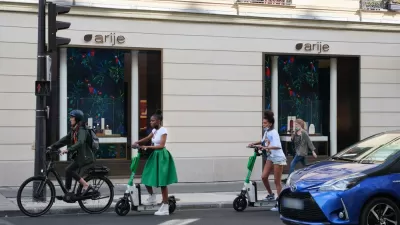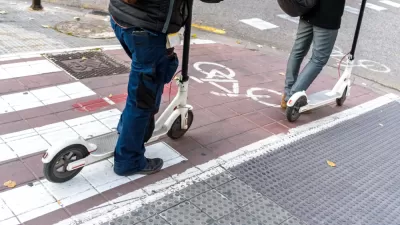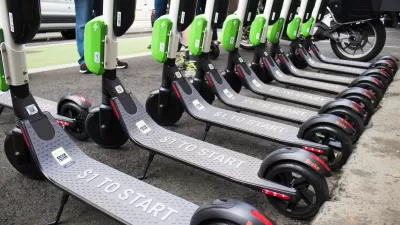Regulations for the operation of electric scooter share in Columbus, Ohio require companies to distribute scooter in low-income neighborhoods. The companies haven't been living up to their part of the deal.

Doug Caruso and Rick Rouan report on a developing controversy in Columbus, where the city is cracking down on electric scooter company Bird, for failing to place 20 percent of its scooters in "opportunity" neighborhoods around the city.
A city administrator sent a violation letter to Bird in April that threatened to impound the company’s scooters if it didn’t start placing 20 percent of its scooters in opportunity neighborhoods as its contract requires. A Dispatch analysis of trip data for March showed that of more than 6,700 Bird trips that month, just 40 started in an opportunity neighborhood.
Bird isn't the only company having a problem meeting the city's requirements.
A look at data that Lime reports to the city shows that the company met the requirement on just 19 days from December through March. Lime’s record improved in late March, when a city official sent an email reminding the company of its responsibilities under the contract.
Lime met the goal between March 23 and March 30, after receiving the letter.
Meanwhile, the city could seize Bird's scooters if the company doesn't clean up its act.
FULL STORY: Scooter companies are slow to move to struggling neighborhoods

Planetizen Federal Action Tracker
A weekly monitor of how Trump’s orders and actions are impacting planners and planning in America.

Maui's Vacation Rental Debate Turns Ugly
Verbal attacks, misinformation campaigns and fistfights plague a high-stakes debate to convert thousands of vacation rentals into long-term housing.

Restaurant Patios Were a Pandemic Win — Why Were They so Hard to Keep?
Social distancing requirements and changes in travel patterns prompted cities to pilot new uses for street and sidewalk space. Then it got complicated.

In California Battle of Housing vs. Environment, Housing Just Won
A new state law significantly limits the power of CEQA, an environmental review law that served as a powerful tool for blocking new development.

Boulder Eliminates Parking Minimums Citywide
Officials estimate the cost of building a single underground parking space at up to $100,000.

Orange County, Florida Adopts Largest US “Sprawl Repair” Code
The ‘Orange Code’ seeks to rectify decades of sprawl-inducing, car-oriented development.
Urban Design for Planners 1: Software Tools
This six-course series explores essential urban design concepts using open source software and equips planners with the tools they need to participate fully in the urban design process.
Planning for Universal Design
Learn the tools for implementing Universal Design in planning regulations.
Heyer Gruel & Associates PA
JM Goldson LLC
Custer County Colorado
City of Camden Redevelopment Agency
City of Astoria
Transportation Research & Education Center (TREC) at Portland State University
Jefferson Parish Government
Camden Redevelopment Agency
City of Claremont





























